
The Remains of the Day is a 1989 novel by the Nobel Prize-winning British author Kazuo Ishiguro. The protagonist, Stevens, is a butler with a long record of service at Darlington Hall, a fictitious stately home near Oxford, England. In 1956, he takes a road trip to visit a former colleague, and reminisces about events at Darlington Hall in the 1920s and 1930s.
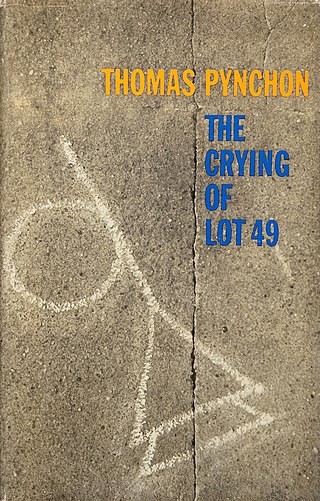
The Crying of Lot 49 is a novella by the American author Thomas Pynchon. It was published on April 27, 1966, by J. B. Lippincott & Co. The shortest of Pynchon's novels, the plot follows Oedipa Maas, a young Californian woman who begins to embrace a conspiracy theory as she possibly unearths a centuries-old feud between two mail distribution companies. One of these companies, Thurn and Taxis, actually existed, operating from 1490–1990, and was the first private firm to distribute postal mail. Like most of Pynchon's writing, The Crying of Lot 49 is often described as postmodernist literature. Time included the novel in its "TIME 100 Best English-Language Novels from 1923 to 2005".

The Daily Mail is a British daily middle-market tabloid newspaper published in London. It was founded in 1896. As of 2020, it was the highest paid circulation newspaper in the UK. Its sister paper The Mail on Sunday was launched in 1982, a Scottish edition was launched in 1947, and an Irish edition in 2006. Content from the paper appears on the MailOnline news website, although the website is managed separately and has its own editor.
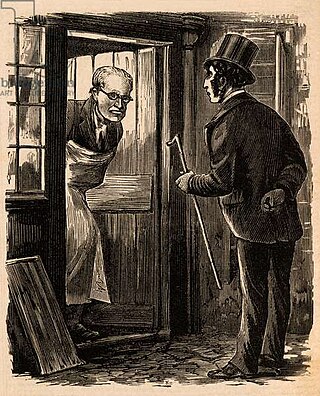
Charles Peace was an English burglar and murderer, who embarked on a life of crime after being maimed in an industrial accident as a boy.
The heat death of the universe is a hypothesis on the ultimate fate of the universe, which suggests the universe will evolve to a state of no thermodynamic free energy, and will therefore be unable to sustain processes that increase entropy. Heat death does not imply any particular absolute temperature; it only requires that temperature differences or other processes may no longer be exploited to perform work. In the language of physics, this is when the universe reaches thermodynamic equilibrium.

Michael Frayn, FRSL is an English playwright and novelist. He is best known as the author of the farce Noises Off and the dramas Copenhagen and Democracy.
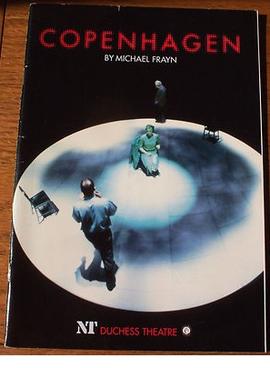
Copenhagen is a play by Michael Frayn, based on an event that occurred in Copenhagen in 1941, a meeting between the physicists Niels Bohr and Werner Heisenberg, who had been Bohr's student. It premiered in London in 1998, at the National Theatre, running for more than 300 performances, starring David Burke, Sara Kestelman, and Matthew Marsh.

Saturday (2005) is a novel by Ian McEwan. It is set in Fitzrovia, central London, on Saturday, 15 February 2003, as a large demonstration is taking place against the United States' 2003 invasion of Iraq. The protagonist, Henry Perowne, a 48-year-old neurosurgeon, has planned a series of errands and pleasures, culminating in a family dinner in the evening. As he goes about his day, he ponders the meaning of the protest and the problems that inspired it; however, the day is disrupted by an encounter with a violent, troubled man.

William Henry ('Will') Dyson was an Australian illustrator, artist and political cartoonist who achieved international recognition. He initially worked as a freelance artist in Australia, developing a specialty as a caricaturist, notably in The Bulletin magazine. In 1909 Dyson married Ruby Lindsay and the couple settled in London soon afterwards. As cartoonist for The Daily Herald newspaper, Dyson became widely known as an illustrator and commentator supporting progressive social reforms in Britain. His cartoons were often controversial, tackling difficult issues such as poverty, inequality and war, and were characterised by their biting wit and artistic impact. At the outbreak of World War I Dyson directed his scathing artwork at German militarism. In 1916 he applied to join the Australian forces at the Western Front as an artist. He was appointed an honorary lieutenant and joined the Anzac troops in France in January 1917. By the following May his appointment as Australia's first official war artist was formalised. After the death of his wife in March 1919 Dyson went through a difficult emotional period, during which his artistic output suffered. In late 1924 he returned to Australia after accepting a contract to work for the Herald publishing group in Melbourne. Dyson returned to England in 1930. He died in London in 1938, aged 57.
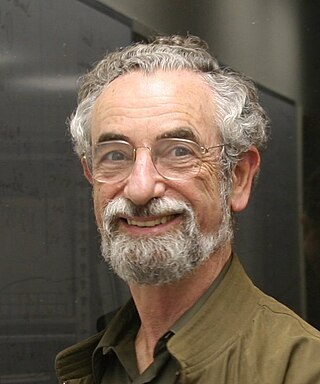
Elliott Hershel Lieb is an American mathematical physicist. He is a professor of mathematics and physics at Princeton University. Lieb's works pertain to quantum and classical many-body problem, atomic structure, the stability of matter, functional inequalities, the theory of magnetism, and the Hubbard model.

Noises Off is a 1992 American comedy film directed by Peter Bogdanovich, with a screenplay by Marty Kaplan based on the 1982 play of the same name by Michael Frayn. Its ensemble cast includes Michael Caine, Carol Burnett, Christopher Reeve, John Ritter, Marilu Henner, Nicollette Sheridan, Julie Hagerty and Mark Linn-Baker, as well as featuring the last performance of Denholm Elliott, who died in October that year.
The Magician's House is a quartet of children's fantasy books by William Corlett. Two mini-series were produced in 1999 for British television, which were directed by Paul Lynch. The series featured Jennifer Saunders and Stephen Fry voicing some of the animal characters.

The Day the Earth Caught Fire is a 1961 British science fiction disaster film directed by Val Guest and starring Edward Judd, Leo McKern and Janet Munro. It is one of the classic apocalyptic films of its era. The film opened at the Odeon Marble Arch in London on 23 November 1961. In August 2014 a restored version was screened at the British Museum's summer open air cinema.
Toby Harnden is a British-American author and journalist who was awarded the Orwell Prize for Books in 2012. He is the author of First Casualty: The Untold Story of the CIA Mission to Avenge 9/11, published by Little, Brown in September, 2021. He spent almost 25 years working for British newspapers, mainly as a foreign correspondent. From 2013 until 2018, he was Washington bureau chief of The Sunday Times. He previously spent 17 years at The Daily Telegraph, based in London, Belfast, Washington, Jerusalem and Baghdad, finishing as US Editor from 2006 to 2011. The book's title is a reference to paramilitary officer Johnny Micheal Spann, a member of the CIA's Team Alpha, whose eight members became the first Americans behind enemy lines in Afghanistan following the 9/11 attacks of 2001. He is the author of two previous books: Bandit Country: The IRA & South Armagh (1999) and Dead Men Risen: The Welsh Guards and the Defining Story of Britain's War in Afghanistan (2011). He was reporter and presenter of the BBC Panorama Special programme Broken by Battle about suicide and PTSD among British soldiers, broadcast in 2013.

The Strangest Man: The Hidden Life of Paul Dirac, Quantum Genius is a 2009 biography of quantum physicist Paul Dirac written by British physicist and author, Graham Farmelo, and published by Faber and Faber. The book won the Biography Award at the 2009 Costa Book Awards, and the 2009 Los Angeles Times Book Prize for Science and Technology.

Dying Earth is a subgenre of science fantasy or science fiction which takes place in the far future at either the end of life on Earth or the end of time, when the laws of the universe themselves fail. Themes of world-weariness, innocence, idealism, entropy, heat death of the universe, (permanent) exhaustion/depletion of many or all resources, and the hope of renewal dominate. A related subgenre set in the distant future of entropic decay is called entropic romance.

The Seven Basic Plots: Why We Tell Stories is a 2004 book by Christopher Booker containing a Jung-influenced analysis of stories and their psychological meaning. Booker worked on the book for 34 years.
Nekrassov, or the Farce in Eight Scenes is a satirical drama written by Jean-Paul Sartre in 1955.
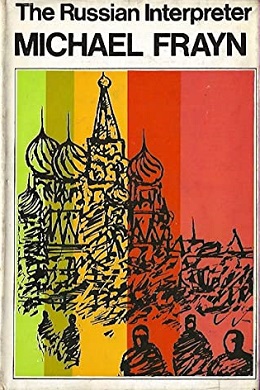
The Russian Interpreter is the second novel by English author Michael Frayn published in 1966 by Collins in the UK and by Viking Press in the US. It won the Hawthornden Prize in 1967. Michael Frayn was himself an interpreter in Moscow in the 1950s.















